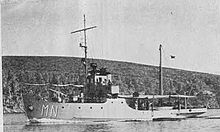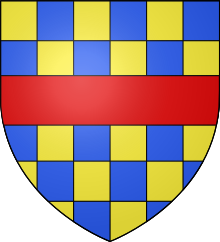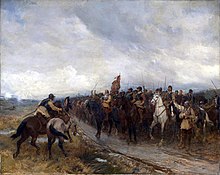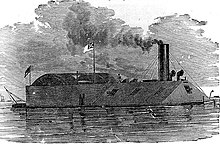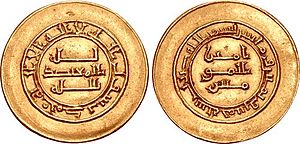Portal:History
The History Portal

History by Frederick Dielman
History (derived from Ancient Greek ἱστορία (historía) 'inquiry; knowledge acquired by investigation') is the systematic study and documentation of human past. History is an academic discipline which uses a narrative to describe, examine, question, and analyze past events, and investigate their patterns of cause and effect. Historians debate which narrative best explains an event, as well as the significance of different causes and effects. Historians debate the nature of history as an end in itself, and its usefulness in giving perspective on the problems of the present.
The period of events before the invention of writing systems is considered prehistory. "History" is an umbrella term comprising past events as well as the memory, discovery, collection, organization, presentation, and interpretation of these events. Historians seek knowledge of the past using historical sources such as written documents, oral accounts or traditional oral histories, art and material artifacts, and ecological markers. History is incomplete and still has debatable mysteries.
Stories common to a particular culture, but not supported by external sources (such as the tales surrounding King Arthur), are usually classified as cultural heritage or legends. History differs from myth in that it is supported by verifiable evidence. However, ancient cultural influences have helped create variant interpretations of the nature of history, which have evolved over the centuries and continue to change today. The modern study of history is wide-ranging, and includes the study of specific regions and certain topical or thematic elements of historical investigation. History is taught as a part of primary and secondary education, and the academic study of history is a major discipline in universities.
Herodotus, a 5th-century BCE Greek historian, is often considered the "father of history", as one of the first historians in the Western tradition, though he has been criticized as the "father of lies". Along with his contemporary Thucydides, he helped form the foundations for the modern study of past events and societies. Their works continue to be read today, and the gap between the culture-focused Herodotus and the military-focused Thucydides remains a point of contention or approach in modern historical writing. In East Asia a state chronicle, the Spring and Autumn Annals, was reputed to date from as early as 722 BCE, though only 2nd-century BCE texts have survived. The title "father of history" has also been attributed, in their respective societies, to Sima Qian and Ibn Khaldun. (Full article...)
Featured picture
Did you know (auto generated)

- ... that The Fader praised "Montgomery Brawl" as "a hilarious recap" of the brawl and a "song a piece of history deserves"?
- ... that the Otoskwin–Attawapiskat River Provincial Park, protecting the Otoskwin and Attawapiskat Rivers in Ontario, Canada, has archaeological and historical sites dating from 3000 BC to the 1800s?
- ... that Joe Kraker was said to be the only lineman in football history to play without shoulder pads?
- ... that during the first tour to the Soviet Union by any American ballet company, Lupe Serrano danced the first encore in the American Ballet Theatre's history?
- ... that political scientist Selwyn Ryan has been called "the author of record for the ... modern political history" of Trinidad and Tobago?
- ... that throughout the history of education in Wales, schools have been held in monastic settlements, cathedrals, residential houses, marketplaces, barns, churches, and village halls?
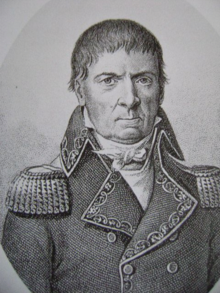
Jean-François Marie de Surville (18 January 1717 – 8 April 1770) was a merchant captain with the French East India Company. He commanded a voyage of exploration to the Pacific in 1769–70.
Born in Brittany, France, Surville joined the French East India Company in 1727 at the age of 10. For the next several years he sailed on voyages in Indian and Chinese waters. In 1740 he joined the French Navy; he fought in the War of the Austrian Succession and the Seven Years' War, twice becoming a prisoner of war. After his military career he rejoined the French East India Company. In 1769, in command of Saint Jean-Baptiste, he sailed from India on an expedition to the Pacific looking for trading opportunities. He explored the seas around the Solomon Islands and New Zealand before proceeding eastward across the South Pacific towards South America. Part of his route around New Zealand overlapped that of James Cook in Endeavour, which had preceded him by only a few days. De Surville drowned off the coast of Peru on 8 April 1770 while seeking help for his scurvy-afflicted crew. (Full article...)On this day
August 31: Independence Day in Malaysia (1957); Romanian Language Day in Moldova and Romania

- 1218 – Al-Kamil became the fourth sultan of the Ayyubid dynasty of Egypt.
- 1888 – The body of Mary Ann Nichols, the alleged first victim of an unidentified serial killer known as Jack the Ripper (pictured), was found in Buck's Row, London.
- 1942 – The Matagorda hurricane, the most intense and costliest tropical cyclone of the 1942 Atlantic hurricane season, dissipated after causing $26.5 million in damages and eight deaths.
- 1969 – On the final day of the Isle of Wight Festival 1969, attended by approximately 150,000 people over three days, Bob Dylan appeared in his first gig in three years.
- 2019 – A sightseeing helicopter crashed in the mountains of Skoddevarre in Alta, Norway, killing all six people on board.
- Aidan of Lindisfarne (d. 651)
- Alma Mahler (b. 1879)
- Feng Tianwei (b. 1986)
- William McAloney (d. 1995)
Selected quote
Time's glory is to command contending kings,
To unmask falsehood, and bring truth to light.— William Shakespeare, playwright
Related portals
More Did you know...
- ... that, when Ghenadie Petrescu (pictured) was ousted from his post of Metropolitan-Primate, Romania experienced protests and riots?
- ... that the British destroyer HMS Highlander escorted Convoy SC 122 through the largest convoy battle of World War II in March 1943 and was unsuccessfully attacked by U-441 and U-608?
- ... that in 1911, John Gaunt's second biplane nearly crashed because a bystander bent the aircraft's elevator before a flight?
- ... that Themistokli Gërmenji, an Albanian nationalist, received the French Croix de Guerre in November 1917, but was executed shortly thereafter by a French military court?
- ... that fish-knives inscribed with Elokeshi's name were sold after her husband decapitated her with a fish-knife following her adulterous affair with a Hindu head-priest?
- ... that the ancient Roman dancer Galeria Copiola reached the age of 104?
- ... that to escape burning at the 1393 Bal des Ardents Charles VI of France huddled under the gown of the Duchesse de Berry, while a lord leaped into a wine vat?
- ... that a junior officer on the USS Ancon refused King George VI entry to the ship's intelligence centre because no one told him the King "was a Bigot"?
Topics
Categories

History • By period • By region • By topic • By ethnic group • Historiography • Archaeology • Books • Maps • Images • Magazines • Organizations • Fictional • Museums • Pseudohistory • Stubs • Timelines • Chronology • People • Wikipedia historians
WikiProjects
![]() WikiProject History •
Ancient Near East • Australian History • Classical Greece and Rome • Dacia • Former countries • History of Canada • Chinese history • European history • Heraldry and vexillology • Indian history • Jewish history • Medieval Scotland • Mesoamerica • Military history • Middle Ages • History of Science
WikiProject History •
Ancient Near East • Australian History • Classical Greece and Rome • Dacia • Former countries • History of Canada • Chinese history • European history • Heraldry and vexillology • Indian history • Jewish history • Medieval Scotland • Mesoamerica • Military history • Middle Ages • History of Science
WikiProject Time • Days of the Year • Years
WikiProject Biography • Composers • Political figures • Saints • United States Presidents
Things you can do
 |
Here are some tasks awaiting attention:
|
Associated Wikimedia
The following Wikimedia Foundation sister projects provide more on this subject:
-
Commons
Free media repository -
Wikibooks
Free textbooks and manuals -
Wikidata
Free knowledge base -
Wikinews
Free-content news -
Wikiquote
Collection of quotations -
Wikisource
Free-content library -
Wikiversity
Free learning tools -
Wiktionary
Dictionary and thesaurus



